News
SEE Dollar To Naira Exchange Rate Today August 22, 2024: Black Market And CBN Official Rates
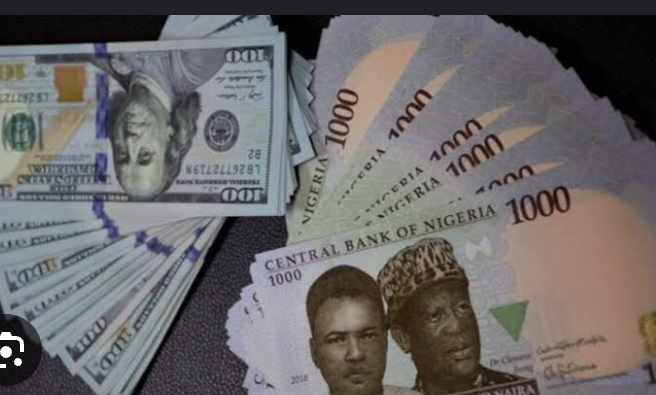
By Kayode Sanni-Arewa
What is the Dollar to Naira Exchange rate at the black market also known as the parallel market (Aboki fx)? For many Nigerians, especially those engaged in foreign trade, travel, and investments, there is a nagging concern for the dollar-naira black market exchange rate.
Dollar to Naira Exchange rate DOLLAR TO NAIRA EXCHANGE RATE Dollar To Naira Exchange Rate Today Black Market and CBN official Exchange Markets: What is the Dollar to Naira Exchange rate at the black market also known as the parallel market (Aboki fx)? For many Nigerians, especially those engaged in foreign trade, travel, and investments, there is a nagging concern for the dollar-naira black market exchange rate. Advertisement 5 The black market rate for dollars to naira, parallel or Aboki FX as some know it will most of the time give different rates from the official CBN rates. The dollar to naira exchange rate at this point was still wiggling up and down. We will discuss in this article how the rate has moved up to this current dollar to naira exchange rate today, August 22, 2024, what drives the rate, and how all these affect the economy of Nigeria.
*Dollar to Naira Today Black Market.*
Buying Rate: N1600
Selling Rate: N1610
*Official CBN Rates*
Buying Rate: N1590
Selling Rate: N1595
*Understanding the Dollar to Naira Black Market for Forex*
What is the Black Market?
The black market
refers to unofficial exchange channels where currencies are traded without government regulation. This market often provides more competitive rates due to the high demand and limited supply of foreign currencies.
*Why Do People Use the Black Market?*
People turn to the black market due to:
*Favorable Rates:* Often higher than official rates. *Accessibility:* Easier to obtain foreign currency without stringent regulatory requirements.
*Factors Influencing Black Market Rates.*
*Economic Policies*
Government decisions on interest rates, inflation control, and forex regulations by the CBN directly affect the naira’s value. Policy adjustments aimed at stabilizing the naira impact the exchange rates.
*Supply and Demand*
The availability of foreign currency versus its demand significantly influences exchange rates. A shortage of foreign currency or high demand leads to naira depreciation.
*Political Stability*
Geopolitical events and internal political stability affect investor confidence. Political unrest or uncertainty can cause the naira to depreciate, while stability strengthens it.
*Global Economic Conditions*
Global market conditions, such as oil prices, international economic trends, and global inflation rates, influence the naira’s value. A significant drop in oil prices, for instance, negatively impacts Nigeria’s
economy.
*Comparing Dollar to Naira Official and Black Market Rates*
“Why the Disparity?*
Several factors contribute to the disparity:
*Supply and Demand:* Limited availability in the official market drives people to the black market.
*Regulatory Restrictions: CBN* imposes limits on forex availability, leading to higher black market rates.
*Economic Instability:* Fluctuations in oil prices and inflation prompt people to seek more favorable black market rates.
*Impact on the Economy*
High black market rates can:
*Inflation* : Increase costs for imported goods. Investment: Deter foreign *investment* due to economic instability. *Trade:* Benefit exporters while imposing higher costs on importers.
*Using the Parallel Market Safely*
*Tips for Transactions*
*Verify Rates:* Check reliable sources like Aboki FX for the latest rates.
*Reputable Dealers:* Engage with trusted Bureau De Change operators to avoid scams.
*Pounds and Euro to Naira Exchange Rates*
*Pounds to Naira (CBN Rates)*
Buying Rate: ₦2,073
Selling Rate: ₦2,074
*Euro to Naira (Black Market Rates)*
Buying Rate: ₦1,768
Selling Rate: ₦1,780
*Geegpay and Grey: Online Exchange Platforms*
*Geegpay Rates*
EUR (€): Buying at ₦1,690.03,
Selling at ₦1,695.55 GBP (£): Buying at ₦1,950, Selling at ₦1,965
USD ($): Buying at ₦1,504, Selling at ₦1,570
*Grey Rates*
EUR (€): Buying at ₦1,640.03, Selling at ₦1,719 GBP
(£): Buying at ₦1,902, Selling at ₦2,015
USD ($): Buying at ₦1,550, Selling at ₦1,570
*FAQs on Dollar to Naira Exchange Rate.*
How much is a dollar to naira today in the black market? The buying rate is N1601, and the selling rate is N1602 as of August 22, 2024.
*Why does the black market offer higher rates than the CBN?* The black market rates are driven by supply and demand dynamics, regulatory restrictions, and economic instability.
*Is it legal to trade forex in the black market* ? While the CBN discourages it, many engage in the black market due to the unavailability of sufficient forex through official channels.
*What are the risks of trading in the black market?* Among these risks are fluctuating rates, possible frauds, and illegality of such transactions.
*Can the CBN influence black market rates?* The CBN can only influence these rates through monetary policy, forex interventions, and regulatory measures; no direct control exists over such.
*How often do black market rates change?* Rates can change on a daily or even multiple times per day, depending on market conditions and economic news.
*Conclusion on Dollar to Naira Black Market Rate Today.*
The black market dollar-to-naira exchange rate represents an interaction of intricate components: economic factors, regulatory frameworks, and market dynamics.
This is real life to so many Nigerians; it also underlines the depth and scope of challenges and opportunities encountered within the Nigerian economic landscape.
The rates, coupled with their underpinning determinants, are quite instrumental in making decisions related to finance.
*Nigeria to Raise N190 Billion from Bond Market in August.*
The Federal Government of Nigeria, through the Debt Management Office (DMO), has announced its intention to raise N190 billion from the bond market in August 2024. This figure represents a notable 37% decrease from the N300 billion secured during the last bond offer earlier this year.
The bond auction is scheduled for August 22, 2024, and will include three re-openings, each with distinct maturity dates and interest rates. These options aim to attract a wide range of investors, offering them various investment choices. This initiative is part of the government’s broader strategy to manage its debt obligations and finance its budgetary needs effectively.
News
Court Orders Fast-Tracked Trial Of 15 Workers Held In Prison For 6 Yrs Over Patience Jonathan’s Missing Jewellery
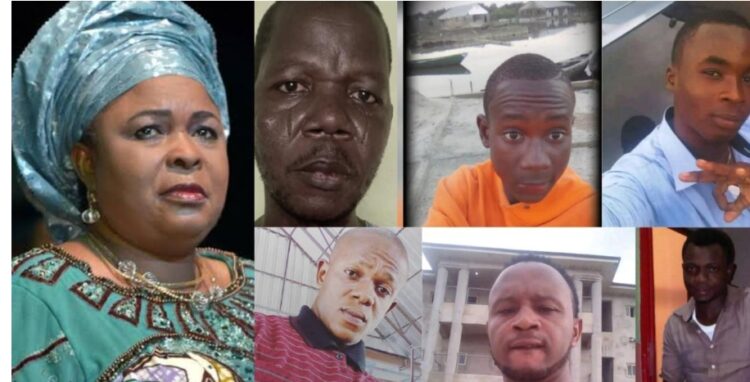
The Bayelsa State High Court has ordered a fast-tracked trial for 15 domestic workers who have spent nearly six years in detention at the Okaka Correctional Centre, Yenagoa, without conviction, over missing jewellery belonging to former First Lady Patience Jonathan.
SaharaReporters gathered that the order came after the prosecution and defence teams reached a rare consensus during Thursday’s proceedings to fast-track the case, which has suffered deliberate and serial delays allegedly masterminded by Patience Jonathan’s private legal team.
“The court proceeded well today, and both parties have agreed to finish the case as soon as possible, with an accelerated hearing. So victory is coming,” a source close to the defence told SaharaReporters.
The 15 accused persons, most of whom were part of Mrs Jonathan’s domestic staff, were arrested in 2019 and have remained in detention without bail, with the case dragging on endlessly for years amid reports of consistent manipulation of court processes.
A previous report by SaharaReporters exposed a pattern of intentional court delays reportedly orchestrated by Mrs Jonathan’s private prosecutors, Ige Asemudara and Samuel Chinedu Maduba, both of whom have been consistently representing the former First Lady since 2019.
“The prosecutors are Ige Asemudara and Samuel Chinedu Maduba,” one of the sources confirmed.
“One of them comes from Lagos while the second travels in from Port Harcourt. They’ve been handling this case from day one, presenting witnesses who come to tell lies. One witness took almost two years,” a source earlier told SaharaReporters.
Sources alleged that Mrs Jonathan gave direct instructions to delay the proceedings.
“The aim is to frustrate the process and keep these innocent people in prison as long as possible. It’s an abuse of the legal system,” a source close to the courtroom told SaharaReporters.
The delay tactics reportedly included health excuses, unreachable witnesses, and repeated adjournments based on flimsy reasons. “Sometimes, Ige Asemudara would claim he is sick or his witness has work. Other times, he just asks for long adjournments,” said another insider.
Shockingly, the judiciary itself was not spared from complicity allegations. A source revealed that the presiding judge initially delayed hearing the bail applications, claiming she wanted to listen to some of the prosecution’s evidence first to determine the nature of the charges.
“When the case started in 2019, they all applied for bail,” the source said. “But the judge told their lawyers to wait so she could hear some evidence. After that, she shockingly denied bail, saying the offences were capital and therefore not bailable.”
Meanwhile, the Bayelsa State High Court has denied any involvement in the delays, recently restating its commitment to speedy justice and dismissing reports of suspects’ trials being delayed.
The court, in a reaction to reports that alleged that the trial of 15 domestic workers facing trial for burglary and theft of jewellery, was being delayed, said the claim was false.
It claimed that, according to available records, the matter had suffered delays due to multiple defence lawyers who must cross-examine witnesses, which had slowed down proceedings. It added that the case had also suffered several adjournments at the instance of counsel.
The delays have left the defence team and families of the detainees stunned, particularly since the prosecution reportedly failed to produce any convincing evidence to support the capital charges.
The affected persons are Williams Alami, Vincent Olabiyi, Ebuka Cosmos, John Dashe, Tamunokuro Abaku, Sahabi Lima, Emmanuel Aginwa, Erema Deborah, Precious Kingsley, Tamunosiki Achese, Salomi Wareboka, Sunday Reginald, Boma Oba, Vivian Golden and Emeka Benson.
They have remained behind bars without justice, caught in the web of power, influence, and a compromised legal process.
With the court finally conceding to an accelerated hearing, hope has once again sparked for the victims of this legal nightmare.
News
Catholic Church gives Anambra APC guber candidate rigid conditions for support
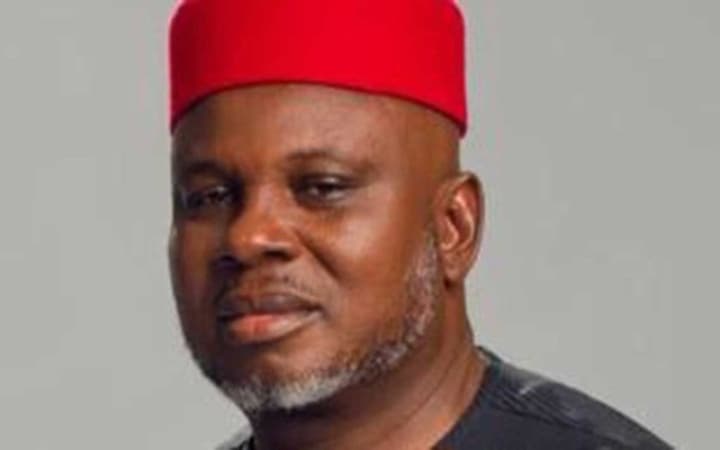
Barely 10 days after he emerged as the All Progressives Congress (APC) gubernatorial standard bearer for the November 8 gubernatorial poll in Anambra State, Prince Nicholas Chukwujekwu Ukachukwu has been given rigid conditions to receive the support of the Catholic Church in the state.
Sources told The Guardian that the basic conditions set before the APC governorship candidate include the selection of a deputy from the Catholic fold, and also that 60 per cent of his cabinet must be Catholics.
This is just as the APC governorship hopeful has been inundated by lobbyists for the position of running mate, even as he engaged with concerned APC stakeholders in the state in a bid to find common ground with various women groups agitating for gender parity.
The Guardian learned that the race for Ukachukwu’s running mate had been narrowed down between two former female Senators, Dr. Uche Lilian Ekwunife and Dr. Margery Okadigbo, who hail from the Central and North Senatorial Districts of the state, respectively.
Although both female politicians are Catholics, the factor of zoning is said to be impacting their chances, because while the more politically active Ekwunife hails from the populous Anambra Central District, Mrs. Okadigbo is from Anambra North, which has just served out eight years of governorship through Willie Obiano.
Also, the fact of her maiden community, Igboukwu in Aguata Local Council, and influence as the current Director General of South East Governors’ Forum is ticking in Ekwunife’s favour, as her candidacy is expected to help slice the votes in Old Aguata Union from where the incumbent Governor Chukwuma Soludo hails. (The Guardian)
News
NJC investigates 18 Imo judges over suspected age falsification
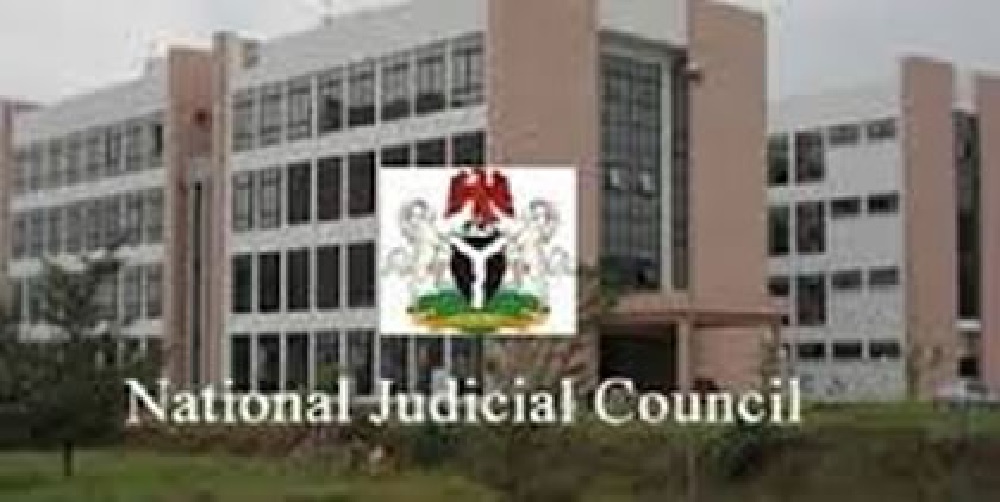
The National Judicial Council has launched a probe into 18 judges in the Imo State judiciary over allegations of age falsification, in a development raising fresh concerns about integrity and transparency within Nigeria’s judicial system.
The NJC, in a statement on Thursday by its Deputy Director of Information, Kemi Ogedengbe, confirmed that the allegations were being treated with utmost seriousness and were currently under review.
“Allegations of this nature require detailed investigation before any action can be taken,” Ogedengbe stated.
“The NJC is investigating the allegations and may take a decision by the end of the month. For now, we cannot act without completing our inquiries. The council will convene and make decisions on the matter.”
The investigation follows a petition submitted by a civil society group, Civil Society Engagement Platform, which described the matter as an “unprecedented breach of judicial integrity.”
The group alleged that the judges deliberately manipulated their birth records to either prolong their tenure or gain appointments within the judiciary.
In a letter addressed to the NJC Chairman and Chief Justice of Nigeria, Justice Kudirat Kekere-Ekun, the platform cited discrepancies in the judges’ official documents, including Law School registration forms, Department of State Services reports, and Nominal Rolls.
The petition, signed by CSEP’s Director of Investigation, Comrade Ndubuisi Onyemaechi, included what it described as compelling documentary evidence marked as Exhibits 001 to 018.
Among those named in the petition is Justice I. O. Agugua, who reportedly has two different birth dates—May 10, 1959, and May 10, 1960—and is also facing separate allegations of misconduct.
Justice C. A. Ononeze-Madu is alleged to have birth records stating both July 7, 1963, and July 7, 1965, while Justice M. E. Nwagbaoso is accused of presenting conflicting dates of birth—August 20, 1952, and August 20, 1962.
The remaining 15 judges also reportedly have varying inconsistencies in their personal data, a revelation that has intensified public scrutiny of the judiciary’s accountability mechanisms.
The NJC, which is constitutionally empowered to discipline judicial officers, is expected to reconvene soon to deliberate on the findings of its inquiry and take appropriate disciplinary actions where necessary.
The unfolding development comes amid mounting calls for institutional reforms to restore public trust in the judiciary and reinforce ethical standards across all arms of government.
-

 News23 hours ago
News23 hours agoBREAKING: Unknown gunmen reportedly storm Senator Natasha’s family residence
-

 News17 hours ago
News17 hours agoAbuja light rail project must be commissioned on May 29-Wike vows
-

 News23 hours ago
News23 hours agoLawmaker Slams NBA Over Rivers Crisis, Demands Return of N300m
-

 News8 hours ago
News8 hours agoTinubu Remains Engaged In Governance From Europe, Will Return After Easter – Presidency
-
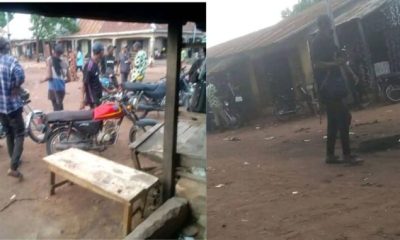
 News18 hours ago
News18 hours agoJust in: Alleged Herdsmen Armed With AK-47 Rifles Take Over Communities In Benue State
-

 News21 hours ago
News21 hours agoFinally , Lagos Court frees Quadri, young Nigerian who stood before Obi’s convoy in viral photo
-

 News18 hours ago
News18 hours agoSEYI Tinubu Speaks On Alleged Abduction, Brutalization Of NANS President Atiku Abubakar Isah
-

 Foreign8 hours ago
Foreign8 hours agoTrump To Close US Embassies In South Sudan, France, Others






